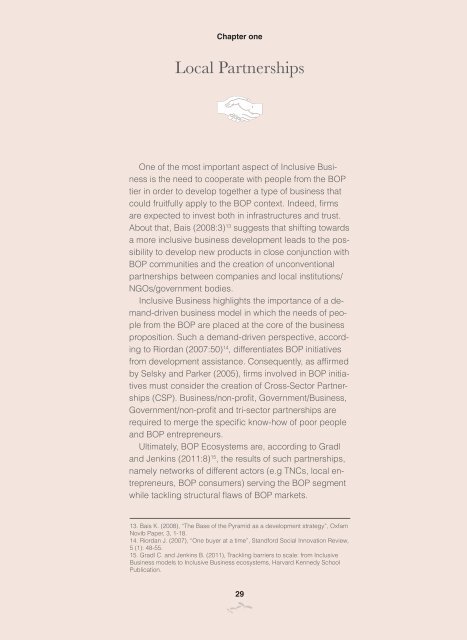INCLUSIVE BUSINESS
You also want an ePaper? Increase the reach of your titles
YUMPU automatically turns print PDFs into web optimized ePapers that Google loves.
Chapter one<br />
Local Partnerships<br />
One of the most important aspect of Inclusive Business<br />
is the need to cooperate with people from the BOP<br />
tier in order to develop together a type of business that<br />
could fruitfully apply to the BOP context. Indeed, firms<br />
are expected to invest both in infrastructures and trust.<br />
About that, Bais (2008:3) 13 suggests that shifting towards<br />
a more inclusive business development leads to the possibility<br />
to develop new products in close conjunction with<br />
BOP communities and the creation of unconventional<br />
partnerships between companies and local institutions/<br />
NGOs/government bodies.<br />
Inclusive Business highlights the importance of a demand-driven<br />
business model in which the needs of people<br />
from the BOP are placed at the core of the business<br />
proposition. Such a demand-driven perspective, according<br />
to Riordan (2007:50) 14 , differentiates BOP initiatives<br />
from development assistance. Consequently, as affirmed<br />
by Selsky and Parker (2005), firms involved in BOP initiatives<br />
must consider the creation of Cross-Sector Partnerships<br />
(CSP). Business/non-profit, Government/Business,<br />
Government/non-profit and tri-sector partnerships are<br />
required to merge the specific know-how of poor people<br />
and BOP entrepreneurs.<br />
Ultimately, BOP Ecosystems are, according to Gradl<br />
and Jenkins (2011:8) 15 , the results of such partnerships,<br />
namely networks of different actors (e.g TNCs, local entrepreneurs,<br />
BOP consumers) serving the BOP segment<br />
while tackling structural flaws of BOP markets.<br />
13. Bais K. (2008), “The Base of the Pyramid as a development strategy”, Oxfam<br />
Novib Paper, 3, 1-18.<br />
14. Riordan J. (2007), “One buyer at a time”, Standford Social Innovation Review,<br />
5 (1): 48-55.<br />
15. Gradl C. and Jenkins B. (2011), Trackling barriers to scale: from Inclusive<br />
Business models to Inclusive Business ecosystems, Harvard Kennedy School<br />
Publication.<br />
29


